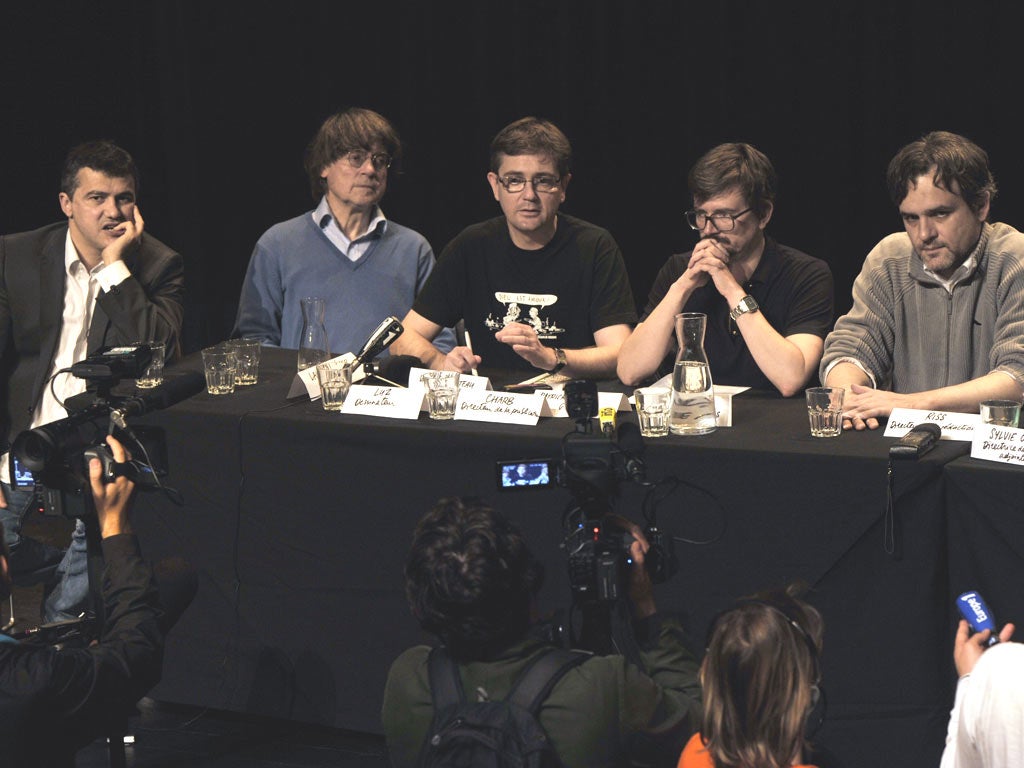More death threats as newspaper escalates Mohamed cartoon row

Death threats have closed the website of a French satirical magazine fire-bombed this week after featuring cartoons of the Prophet Mohamed, but that did not deter the daily Libération from publishing new drawings yesterday in a show of solidarity.
The Belgian company which runs Charlie Hebdo's internet site pulled the plug yesterday after anonymous threats were emailed. The magazine has been the victim of an intensive cyber war waged from the Muslim world, especially Turkey, since it published an edition on Wednesday which it said was "guest-edited by Mohamed", and was littered with Mohamed cartoons.
Charlie Hebdo's Facebook page has been inundated with messages in English, French, Turkish and Arabic, rejoicing in the Molotov cocktail attack which destroyed the magazine's offices in Paris in the early hours of Wednesday. Messages, repeated over and over, include, "Go to the devil, Charlie Hebdo" and "Shame on Charlie Hebdo".
The centre-left Libération risked the wrath of Islamic extremists yesterday by publishing a special edition of Charlie Hebdo, including two new Mohamed cartoons. A four-page supplement, wrapped around the main newspaper, carried a joint Charlie Hebdo-Libération masthead and 17 cartoons drawn by the magazine's regular contributors.
One cartoon showed a bearded man's head on the body of a fire-breathing dragon. The caption asked, "Is this the real face of Mohamed?" Other drawings were self-mocking. One showed a cartoonist in the centre of a defensive ring of heavily armed soldiers. The cartoonist says, "I have got another hilarious gag." A soldier replies, "I was afraid of that."
The attack on the Charlie Hebdo offices, which gutted two floors but caused no injuries, has generated a wave of anger across the French political and media world. The fire-bombing , described as a "terrorist attack" by the interior minister, Claude Guéant – has also been condemned by all mainstream Muslim organisations in France.
Charlie Hebdo (Charlie Weekly), a scurrilous, small-circulation, anarchist magazine started in 1960 and dominated by cartoons, says its "Mohamed" edition was intended as a wry commentary on the rise of Islamist political forces in Tunisia and Libya.
It says that it is not anti-Islamic so much as secular and irreligious. The magazine frequently pokes fun at Catholics and Jews. Several cartoons printed in Libération made fun of the new-found support for Charlie Hebdo from right-wing politicians, including the repressive interior minister, Mr Guéant. One drawing showed the prophet Mohamed boasting, "I succeeded in making Guéant come to Charlie". The magazine has been given temporary office space by Libératio* and is determined to bring out next week's print edition.
But continuing cyber-attacks may force Charlie Hebdo off the internet for some time. Valérie Manteau, who runs the online version of the Charlie Hebdo website, said yesterday that Bluevision, the Belgian internet service provider, had closed down the site after a string of emailed warnings. "They don't want to open again because they have received death threats," she said. "Either the police can reassure them and persuade them it's OK to open or we will have to find another provider." Before it was closed, the Charlie Hebdo site had been pirated by a group of Turkish hackers. The home page of the site was replaced by English and Turkish messages against a green background. One message read: "You continually abuse the prophet Mohamed with disgusting and shameful drawings on the pretext of defending liberty of expression ... We are your cyberspace curse."
The cyber attack was claimed by a group calling itself Akincilar, which is the name of a town in central Turkey. They said that they were "fighting against a publication which attacks our beliefs and our moral values". But the group insisted that it was not involved in – and did not support – the firebomb attack on the Charlie Hebdo offices.
Join our commenting forum
Join thought-provoking conversations, follow other Independent readers and see their replies
Comments